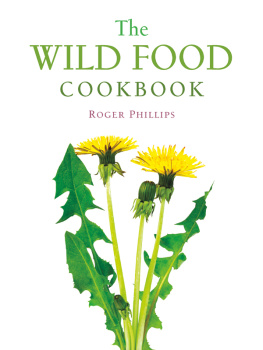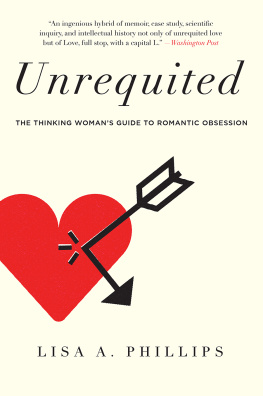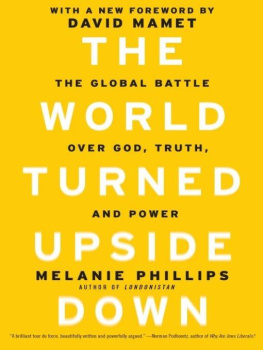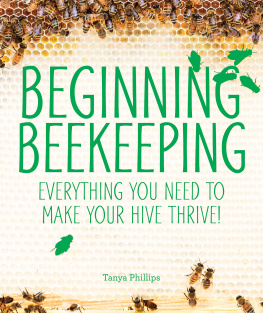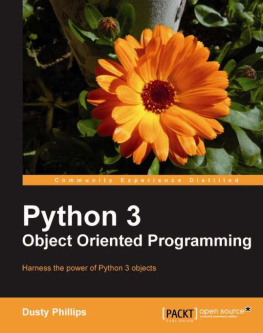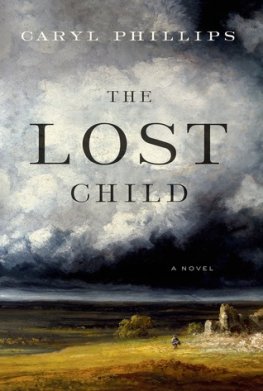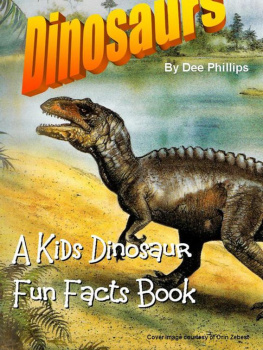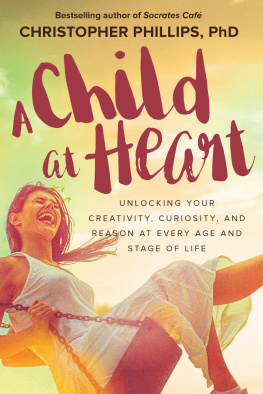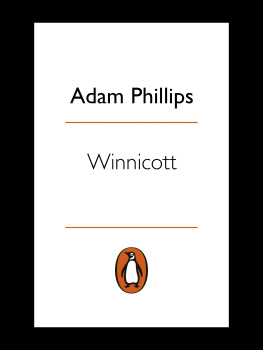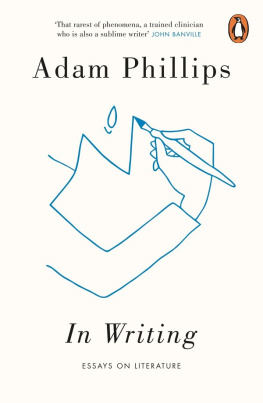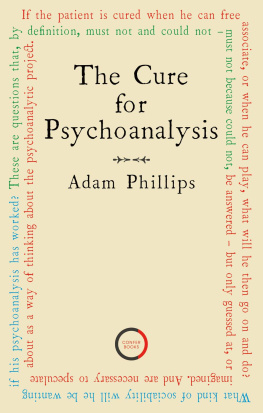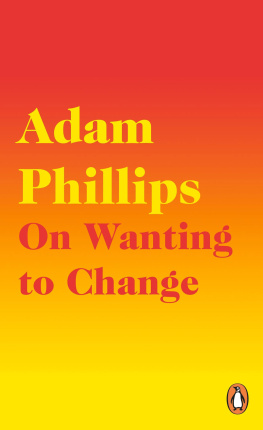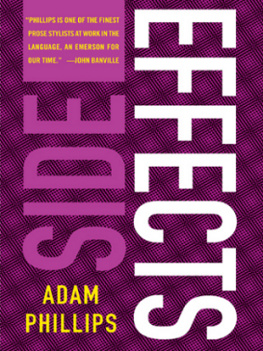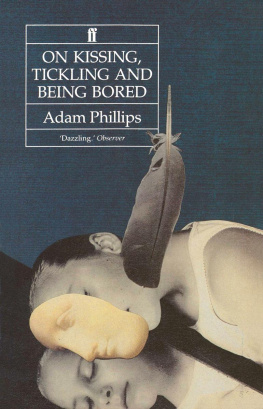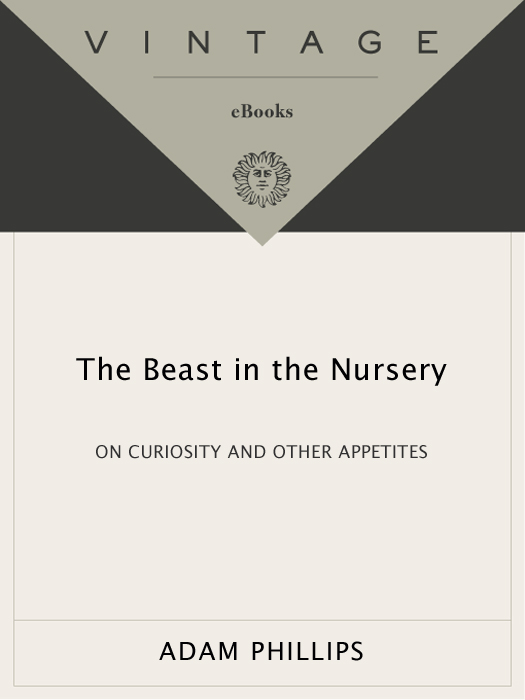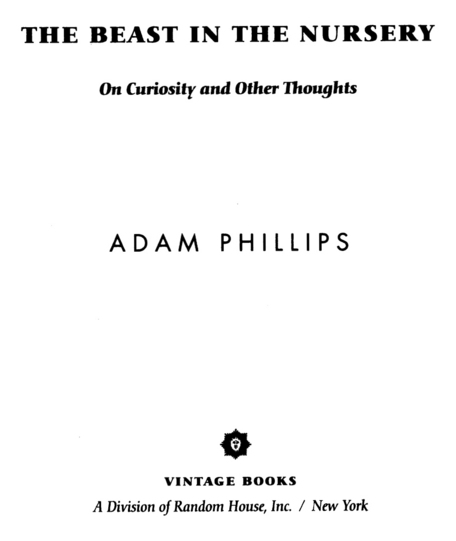Acclaim forADAM PHILLIPS
A lively treatment of psychoanalysis [which] argues that its goal is the exploration and treatment of disorderedi.e., suppressedcuriosity.
The New York Times
Roaming from Francis Bacon to Blake, from Melanie Klein to Keats Adam Phillips writes with more grace and wit than we have the right to expect from a Freudian theorist.
Elle
An extremely lively read Adam Phillips is the latest and brightest of those inventively reinterpreting the subject (of psychoanalysis).
Sunday Telegraph
Phillips has virtually invented the essay as a suitable form for penetrating psychoanalytic enquiry.
Frank Kermode
Adam Phillips may be the closest thing we have to a philosopher of happiness.
Adam Mars-Jones
The psychotherapist of the floating world his genius is the way in which he voices all those things we knew instinctively but could not find words for.
Observer
Like Chekhov, Phillips writes as well as he doctors, and his fascination with the subtleties of human behavior makes him a good storyteller. He has welcome openness to the essential strangeness of every person; this alone is reason enough to read him.
Guardian
In Phillipss hands, nothing is as ordinary as it appears to be. Each essay is a kind of mystery tour; you never know where you are going to end up.
The Times Literary Supplement
ADAM PHILLIPS
THE BEAST IN THE NURSERY
On Curiosity and Other Appetites
Adam Phillips is the author of Winnicott; On Kissing, Tickling, and Being Bored; On Flirtation; Terrors and Experts; and Monogamy. Formerly the principal child psychologist at Charing Cross Hospital in London, he lives in England.
Books byADAM PHILIPS
Winnicott
On Kissing, Tickling, and Being Bored
On Flirtation
Terrors and Experts
Monogamy
Copyright 1998 by Adam Phillips
All rights reserved under International and Pan-American Copyright Conventions. Published in the United States by Vintage Books, a division of Random House, Inc., New York, and simultaneously in Canada by Random House of Canada Limited, Toronto. Originally published in hardcover in the United States by Pantheon Books, a division of Random House, Inc., New York, in 1998.
Vintage Books and colophon are registered trademarks of Random House, Inc.
A portion of this book originally appeared in somewhat different form in London Review of Books.
Grateful acknowledgment is made to the following for permission to reprint previously published material: Faber and Faber Ltd.: Excerpt from The Hill of Intrusion from Selected Poems by W. S. Graham. Reprinted by permission of Faber and Faber, Ltd., London. The Free Press and Chatto & Windus: Excerpts from Narrative of a Child Analysis, volume 4 in The Writings of Melanie Klein by Melanie Klein. Copyright 1961 by The Melanie Klein Trust. Rights outside the United States administered on behalf of The Melanie Klein Trust by Chatto & Windus, London. Reprinted by permission of The Free Press, a division of Simon & Schuster, and Chatto & Windus, an imprint of Random House UK Ltd. The Paris Review: Excerpt from an interview with Ted Hughes (The Paris Review #134, Spring 1995). Copyright 1995 by Drue Heinz. Reprinted by permission of The Paris Review.
The Library of Congress has cataloged the Pantheon edition as follows:
Phillips, Adam.
The beast in the nursery / Adam Phillips.
p. cm.
1. Psychoanalysis. I. Title.
BF 173.P568 1998
150.195dc21
eISBN: 978-0-307-77275-6
www.randomhouse.com/vintage
v3.1
For Jacqueline Rose
The reason Ive begun to speak is that I keep wanting to find out for certain: do other people have such pleasures?
Fyodor Dostoevsky, Notes from Underground
the moral ideal being presented as attractive rather than imperative.
Henry Sidgwick, The Methods of Ethics
Something there badly not wrong.
Samuel Beckett, Worstward Ho
and so everyone according to his cue.
William Shakespeare, A Midsummer Nights Dream,
Act 3, Scene 1
Acknowledgments
Different versions of parts of this book appeared in the London Review of Books; Colre, edited by Pierre Pachet (Autrement, Paris, 1997); and Philosophy as Education, edited by Amelie Rorty (RKP, New York, 1997). I am also grateful to have had the opportunity of presenting earlier versions of A Stab at Hinting to various university departments and psychoanalytic groups in Britain and America. These audiences, I hope, will notice their contribution to the final version of this chapter. Presenting consecutive chapters of this book to the Toronto Institute for Contemporary Psychoanalysis made a good deal of difference at a late stage.
Contents
Introduction
All our stories are about what happens to our wishes. About the world as we would like it to be, and the world as it happens to be, irrespective of our wishes and despite our hopes. Our needs thwarted by the needs of others, our romances always threatened by tragedy, our jokes ruined by the people who dont get them. The usual antagonism of daydream and reality. Freud redescribed this old story, at first, as a conflict between what he called the pleasure principle and the reality principle, between the satisfaction we are wanting and whatever frustrates or tempers our desire. And then, rather differently, as a war between the life instinct and the death instinct, a mythic war between nurture, growth, and delight and whatever it is inside us that seeks to destroy our love of life. Freud was not, of course, the first person to notice how precarious our love of life is, how vulnerable this love is the older we get. But he was excessively preoccupied by what interfered with the destiny of this particular passion, a passion that seemed at once fundamental and more vividly imagined through its failure than its success. It was through symptoms, paradoxically, that Freud got a glimpse of what sexuality might be; through slips of the tongue the plenitude of the unspoken revealed itself. And as a very late Romantic, Freud found the passions and perplexities of the child exemplary; the child with her consuming interests, her inexhaustible questions, and her insisting body. The child who is learning to make mistakes, figuring out how to become a person, through the curious combinations of word and gesture, and the gaps between them.
Freud, in fact, translated back to very early childhood the traditional story of growing up as a process of disillusionment. He described a minor epica kind of ironic quest romancegoing on inside the childs mind. The child was imagined as wanting something essential (feeling hungry) and then, in its absence omnipotently fantasizing the longed-for breast. Since the breast was unlikely to appear the moment it was desired, it could nevertheless be imagined instantaneously, according to the childs wish. This was the pleasure principle in action. But then, of course, the child begins to notice that beyond a certain point the imagined breast is not sufficiently nourishing, and in actuality, not nourishing at all. So the reality principle involves the childs learning to defer gratification, acknowledging his desire as an obstacle course, because his desire entails something other than himself. Ultimately, the child needs to abrogate his omnipotenceabjure his magicand learn to wait. Accepting his dependence, and bearing the fact of his parents independence of him, he makes good his survival and his pleasure by relinquishing his fantasies of self-sufficiency (his omnipotent self-satisfyings). There are perils to this processwho the child and his parents happen to be, the transgenerational history the child crawls intobut it is a necessary disillusionment. Being realistic is a better guarantee of pleasure; it is an injunction to want sensibly. The child may expect the earth of himself and others, but if he grows up properly, he will begin to want something else. But what happens to wanting when it isnt wanting everything, and when it isnt wanting what one wants? Or, to put it another wayfrom an adult point of view, as it werehow do we decide what a good story about wanting is? And which stories will sustain our appetite, which is, by definition, our appetite for life? Even to want death you have to be alive. Morality is the way we set limits to wanting; the way we redescribe desiring so that it seems to work for us.


